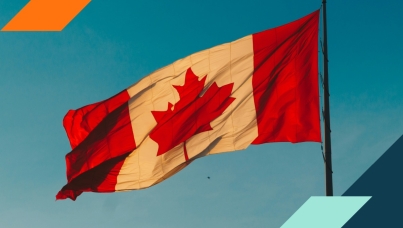Canada Headed For Minority Government: The Question Is Which Party Will Lead it
In fact, the Ipsos-Reid seat model indicates that if the Conservative Party can wrest only 20 more seats from the Liberals they will be in a position to potentially form a minority government.
If a vote were held today the seat model projection prepared by Ipsos-Reid indicates that the Liberals would have a slim, potentially 11-15 seat minority government. However, with only 29% of Canadians believing that the Liberal government under Paul Martin deserves to be re-elected, the Liberals may not have yet bottomed out - having fallen from 36% only two weeks ago to 29% today. This critical number usually indicates the potential floor for decided voters for a governing party.
Clearly, as we have indicated previously, the battleground for minority government status is currently in the province of Ontario. Once the strong-hold of Liberal fortunes, the 106 seat-rich Ontario has the federal Liberals in a nosedive where the seat projection model indicates that if a vote were held today, and the Liberals and Conservatives remained in a statistical tie at 36% each as they are reported in this poll, the Conservatives would garner 40-44 seats (up from 11 seats projected only two weeks ago) with the Liberals netting only 55-59 seats (down sharply from 92 seats during the same time frame).
Where The Vote Is At...
After the first week of federal election campaigning a new Ipsos-Reid survey conducted this past weekend on behalf of The Globe and Mail and CTV reveals that the federal Liberals have reached their lowest level in decided voter support (34%, down 1 point) since Paul Martin became Prime Minister this past winter. In the pivotal province of Ontario, the federal Liberals are now tied with the Conservative Party at 36% decided voter support.
Nationally, the Conservatives (30%, up 4 points) have closed to within 4 points of the Liberals (34%, down 1 point), while NDP support has dropped slightly to 16% (down 2 points). The Bloc Quebecois dominate the federal landscape in Quebec with 44% support (down 6 points) - leading the Liberals (29%, up 1 point) by a 15 point margin. Support for the Green Party is steady at 6% (up 1 point) and 2% of decided voters would vote for some "other " party. Among all Canadians, 12% are undecided or would not vote if an election were held today (down 2 points).
When it comes to the critical question of whether the "federal Liberals deserve to be re-elected under the new leadership of Paul Martin", only 29% of Canadians answer that they are deserving (down from 36% just prior to the writ drop) - compared to 66% of Canadians who say "the Liberal Party does not deserve to be re-elected and it's time for another Federal political party to be given a chance to govern the country".
When considering the momentum of the various parties and their leaders, Canadians give Stephen Harper and the Conservatives (+18, up 10 points) the highest gap momentum score (calculated by subtracting those who say their opinion has worsened from those who say their opinion has improved), followed by Jack Layton and the NDP at +15 (up 6 points), and Gilles Duceppe and the Bloc Quebecois (+2, up 4 points nationally - in Quebec: +17, up 5 points). Paul Martin has very negative momentum coming in with a gap momentum score of -36 (down 10 points).
These are the findings of an Ipsos-Reid/CTV/Globe and Mail poll conducted between May 28th and 30th, 2004. For the telephone survey, a representative randomly selected sample of 1000 adult Canadians was interviewed. With a sample of this size, the results are considered accurate to within 177 3.1 percentage points, 19 times out of 20, of what they would have been had the entire adult Canadian population been polled. The margin of error will be larger within regions and for other sub-groupings of the survey population. These data were weighted to ensure the sample's regional and age/sex composition reflects that of the actual Canadian population according to the 2001 Census data.
Liberal Party At 34% Support Nationally -- Now Tied With Conservatives At 36% In That Province...NDP (16%), Bloc Quebecois (44% In Quebec vs. 29% For Liberals)...
The latest Ipsos-Reid/Globe and Mail/CTV survey shows Liberal support at 34% among decided voters, down 1 point since Ipsos-Reid's last sounding from May 18th-20th. Meanwhile, Conservative Party decided support is up nationally to 30% (up 4 points), and NDP decided support is down slightly to 16% (down 2 points). The Bloc Quebecois dominate the federal landscape in Quebec with 44% support (down 6 points) - leading the Liberals (29%, up 1 point) by a 15 point margin. Nationally, support for the Green Party is steady at 6% (up 1 point) and 2% of decided voters would vote for some "other " party. Among all Canadians, 12% are undecided or would not vote if an election were held today (down 2 points).
- In Ontario, the Liberal's lead has evaporated as they now garner the support of 36% of decided voters (down 6 points) and are now tied with the Conservatives (36%, up 8 points). The NDP hold steady with one in five decided voter support.
- Jack Layton's recent campaigning has not proved fruitful for the NDP in British Columbia, as they have dropped 6 points to 14% decided voter support. The Conservatives with four in ten decided votes lead the Liberals by 5 points in this province, and the Green Party trails with the support of one in ten decided voters.
- In Quebec, a 15 point margin separates the Bloc Quebecois (44%, down 6 points) from the Liberals (29%, down 1 point). The Conservatives and the NDP register low on the federal radar screen in this province.
- In Alberta, the Conservatives (49%, down 5 points) hold a 22 point lead over the Liberals (27%, up 2 points). The NDP is a distant third with one in seven decided voter support.
- In Saskatchewan/Manitoba the Liberals have 36% decided support (up 4 points), leading the Conservatives (30%, down 10 points) by 6 points. The NDP is challenging in this province with one-quarter of decided voter support.
- In Atlantic Canada the Liberals hold a commanding lead with 44% of the decided vote (down 6 points), the NDP and the Conservatives are tied for second with one-quarter of decided voter support.
Two-thirds of Canadians (66%, up from 60% two weeks ago) believe the statement "the Liberal Party does not deserve to be re-elected and it's time for another Federal political party to be given a chance to govern the country" is closest to their own opinion, compared to 29% (down 7 points) who believe the statement "the Liberal Party deserves to be re-elected under the new leadership of Paul Martin" is closest to their own opinion. The remaining 5% of Canadians "don't know" which statement is closest to their own opinion.
- Agreement with the statement "the Liberal Party does not deserve to be re-elected and it's time for another Federal political party to be given a chance to govern the country" is highest in Alberta (76%), with Ontario (67%), Quebec (66%), and British Columbia (66%) trailing, followed by Saskatchewan/Manitoba (59%), and Atlantic Canada (50%).
- Agreement with the statement "the Liberal Party deserves to be re-elected under the new leadership of Paul Martin" is highest in Atlantic Canada (37%), followed by British Columbia (31%), Saskatchewan/Manitoba (31%), Ontario (29%), Quebec (28%), and lastly by Alberta (23%).
- Nearly one in five decided Liberal supporters (17%) believe it's time for a change in government, compared to 96% of Conservative supporters, 87% of NDP supporters, and 95% of Bloc Quebecois supporters.
Canadians were asked whether their opinions of the various major parties and their leaders has improved, stayed the same, or worsened over the last few weeks:
- Three in ten Canadians (32%) say their opinion of Stephen Harper and the Conservative Party has improved over the last few weeks (9% "strongly improved", 23% "somewhat improved"), 42% say their opinion has "stayed the same", and 14% say their opinion has worsened (8% "somewhat worsened", 7% "strongly worsened"). The remaining 12% of Canadians "don't know" if their opinion has changed.
- Another three in ten (29%) say their opinion of Jack Layton and the New Democratic Party has improved over the last few weeks (21% "somewhat improved", 8% "strongly improved"), 44% of Canadians say their opinion has "stayed the same", and 14% say their opinion has worsened (8% "somewhat worsened", 7% "strongly worsened"). The remaining 13% of Canadians "don't know" if their opinion has changed.
- One in ten Canadians (11%) say their opinion of Paul Martin and the Liberal Party has improved over the last few weeks (9% "somewhat improved", 2% "strongly improved), 36% say that it has "stayed the same", and 47% say it has worsened (22% "somewhat worsened", 25% "strongly worsened"). The remaining 5% of Canadians "don't know" if their opinion has changed.
- Gilles Duceppe and the Bloc Quebecois have improved opinion among 12% of Canadians (7% "somewhat improved", 4% "strongly improved"), have "stayed the same" among 55% of Canadians, and worsened among 10% (4% "somewhat worsened", 6% "strongly worsened"). The remaining 23% of Canadians "don't know" if their opinion of Gilles Duceppe and the Bloc Quebecois has changed. In Quebec, one-quarter (26%) say their opinion of Gilles Duceppe and the Bloc Quebecois has improved (10% "strongly improved", 16% "somewhat improved"), 58% say their opinion has stayed the same, and 9% say their opinion has worsened (4% "somewhat worsened", 5% "strongly worsened"). The remaining 7% of Quebecers "don't know" if their opinion has changed.
- Stephen Harper and the Conservatives have had the biggest positive momentum gains in British Columbia (+30, up 25 points), followed by Alberta (+33, up 23 points), Atlantic Canada (+15, up 12 points), Ontario (+16, up 9 points), and Saskatchewan/Manitoba (+4, up 4 points), while momentum in Quebec (+12, down 1 point) is static. Among decided Conservative supporters, Stephen Harper comes in at +64 (up 35 points).
- Jack Layton and the New Democratic Party have had the biggest positive momentum gains in Atlantic Canada (+26, up 18 points), followed by Saskatchewan/Manitoba (+17, up 12 points), Quebec (+14, up 8 points), Ontario (+18, up 6 points), and Alberta (+5, up 3 points), while they have lost some momentum in British Columbia (+3, down 10 points). Among decided NDP supporters, Jack Layton scores +63 (up 35 points).
- Paul Martin and the federal Liberal Party have made some positive momentum gains in Alberta (-33, up 3 points) and Atlantic Canada (-21, up 1 point). But Paul Martin and the Liberals have lost momentum in Quebec (-47, down 18 points), Ontario (-35, down 12 points), British Columbia (-32, down 5 points), and Saskatchewan/Manitoba (-28, down 3 points). Among decided Liberal supporters, Paul Martin scores a +7 (up 5 points).
- Gilles Duceppe scores a +17 in Quebec (up 5 points), and among Bloc Quebecois supporters Mr. Duceppe scores +44 (up 19 points).
In an exclusive seat projection model provided to CTV and The Globe and Mail, the new political numbers translate into a slim minority government if a vote were held today, the Liberals would have a potential of 122-126 seats, the Conservatives would have a potential of 107-111 seats, the NDP would have a potential of 15-19 seats, and the Bloc Quebecois would have a potential of 56-60 seats. In order to achieve a majority government, a party needs a minimum of 155 seats in the House of Commons.
For explanation of the projected seat range model please visit: http://www.ipsos-na.com/news/pressrelease.cfm?id=2197 Please open the attached PDF to view the factum and detailed tables.
-30-
For more information on this news release, please contact:
Darrell Bricker
President & C.O.O
Ipsos-Reid Public Affairs
(416) 324-2900



